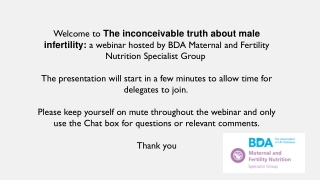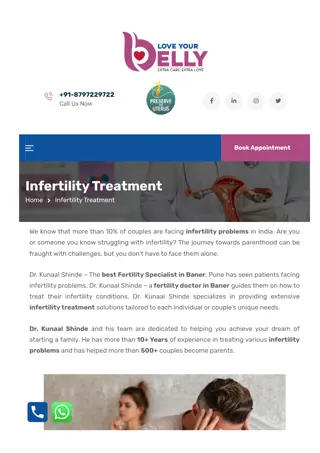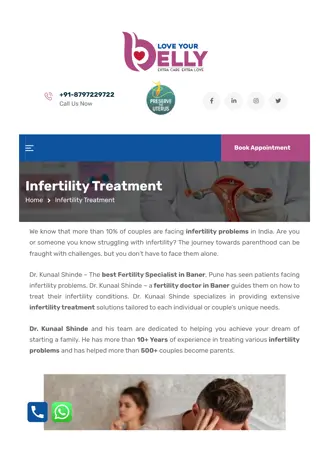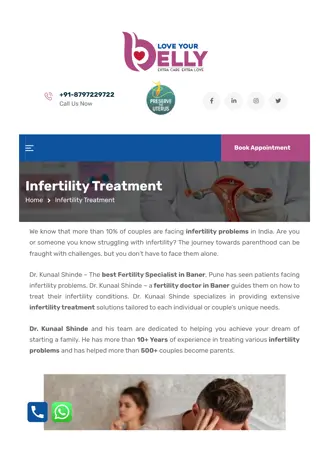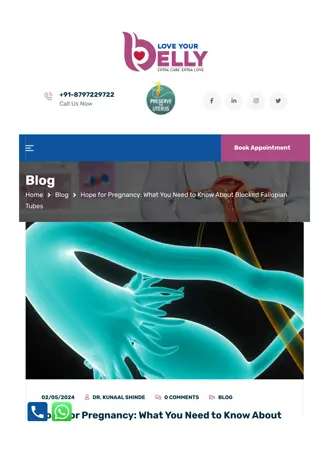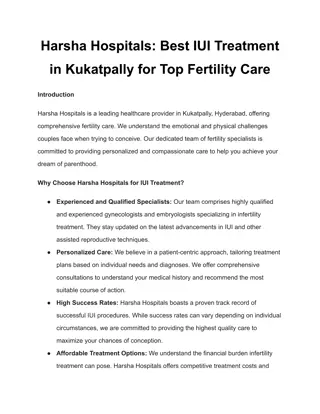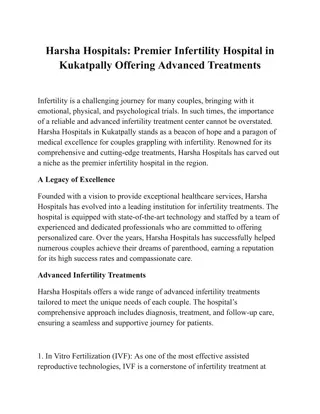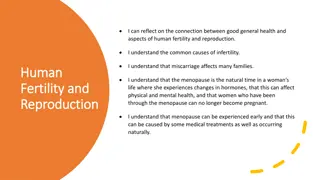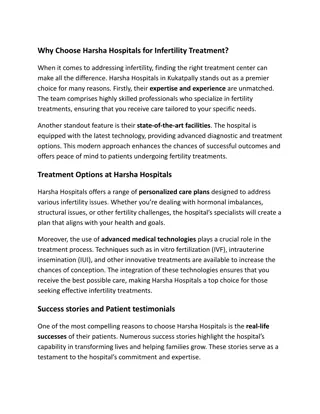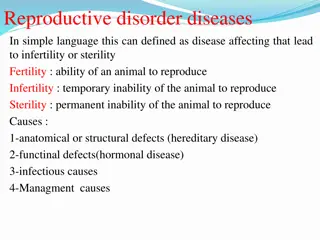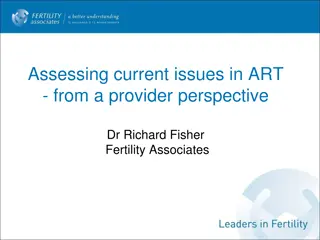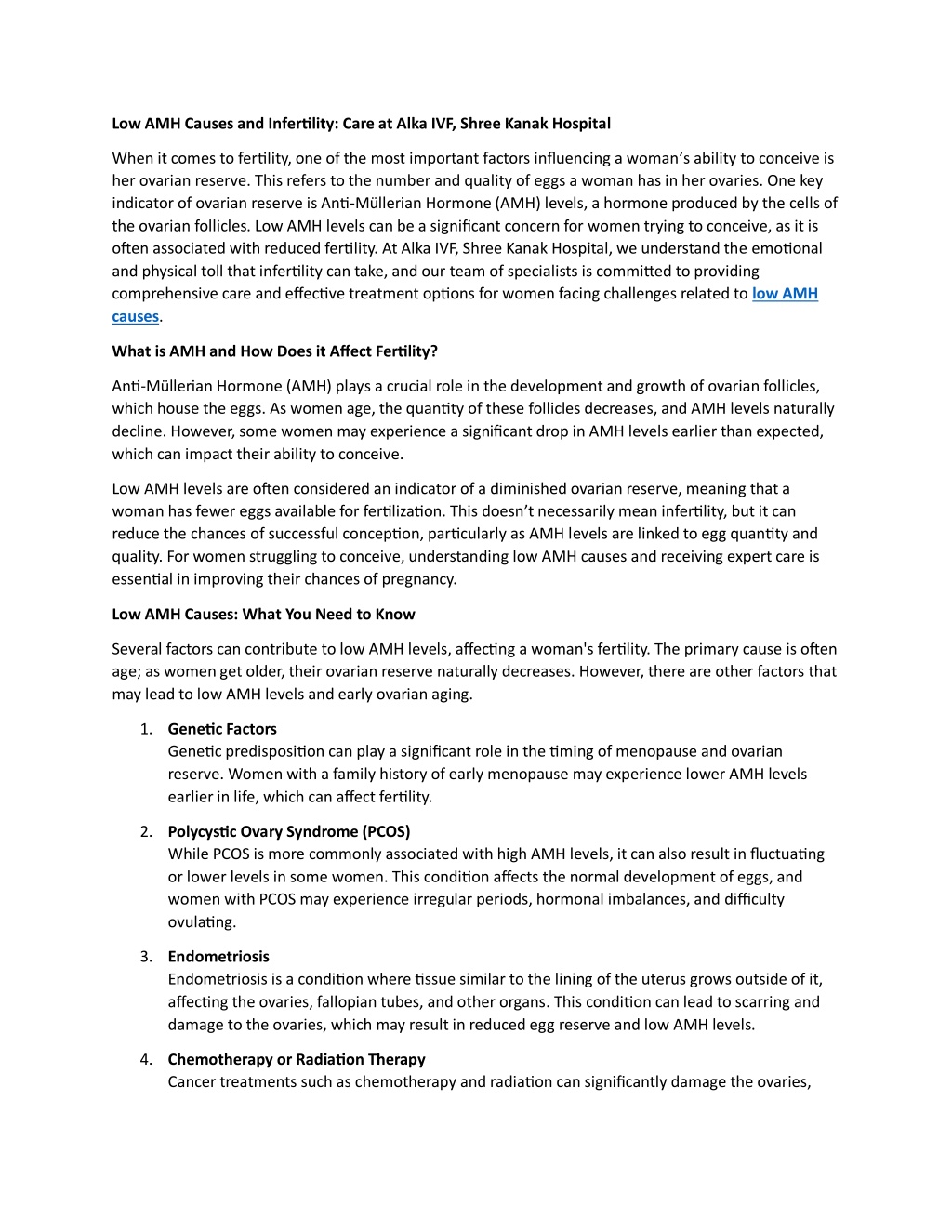
Low AMH Causes and Infertility 12 december
low amh causes
Download Presentation

Please find below an Image/Link to download the presentation.
The content on the website is provided AS IS for your information and personal use only. It may not be sold, licensed, or shared on other websites without obtaining consent from the author. Download presentation by click this link. If you encounter any issues during the download, it is possible that the publisher has removed the file from their server.
E N D
Presentation Transcript
Low AMH Causes and Infertility: Care at Alka IVF, Shree Kanak Hospital When it comes to fertility, one of the most important factors influencing a woman s ability to conceive is her ovarian reserve. This refers to the number and quality of eggs a woman has in her ovaries. One key indicator of ovarian reserve is Anti-M llerian Hormone (AMH) levels, a hormone produced by the cells of the ovarian follicles. Low AMH levels can be a significant concern for women trying to conceive, as it is often associated with reduced fertility. At Alka IVF, Shree Kanak Hospital, we understand the emotional and physical toll that infertility can take, and our team of specialists is committed to providing comprehensive care and effective treatment options for women facing challenges related to low AMH causes. What is AMH and How Does it Affect Fertility? Anti-M llerian Hormone (AMH) plays a crucial role in the development and growth of ovarian follicles, which house the eggs. As women age, the quantity of these follicles decreases, and AMH levels naturally decline. However, some women may experience a significant drop in AMH levels earlier than expected, which can impact their ability to conceive. Low AMH levels are often considered an indicator of a diminished ovarian reserve, meaning that a woman has fewer eggs available for fertilization. This doesn t necessarily mean infertility, but it can reduce the chances of successful conception, particularly as AMH levels are linked to egg quantity and quality. For women struggling to conceive, understanding low AMH causes and receiving expert care is essential in improving their chances of pregnancy. Low AMH Causes: What You Need to Know Several factors can contribute to low AMH levels, affecting a woman's fertility. The primary cause is often age; as women get older, their ovarian reserve naturally decreases. However, there are other factors that may lead to low AMH levels and early ovarian aging. 1.Genetic Factors Genetic predisposition can play a significant role in the timing of menopause and ovarian reserve. Women with a family history of early menopause may experience lower AMH levels earlier in life, which can affect fertility. 2.Polycystic Ovary Syndrome (PCOS) While PCOS is more commonly associated with high AMH levels, it can also result in fluctuating or lower levels in some women. This condition affects the normal development of eggs, and women with PCOS may experience irregular periods, hormonal imbalances, and difficulty ovulating. 3.Endometriosis Endometriosis is a condition where tissue similar to the lining of the uterus grows outside of it, affecting the ovaries, fallopian tubes, and other organs. This condition can lead to scarring and damage to the ovaries, which may result in reduced egg reserve and low AMH levels. 4.Chemotherapy or Radiation Therapy Cancer treatments such as chemotherapy and radiation can significantly damage the ovaries,
leading to a decrease in AMH levels. Women who undergo these treatments in their youth may experience a sudden drop in ovarian reserve, affecting their fertility. 5.Surgical Interventions Ovarian surgeries, such as those performed for cyst removal, can sometimes lead to a decrease in AMH levels. The extent of damage depends on the type of surgery, but it is important for women to discuss fertility preservation options with their doctor before undergoing surgery. 6.Autoimmune Disorders Certain autoimmune disorders can affect ovarian function. These conditions, such as thyroid disorders or lupus, may interfere with hormone production, leading to low AMH levels and reduced fertility. Diagnosis of Low AMH To assess ovarian reserve, AMH levels are typically measured through a blood test. The results can help doctors gauge the number of viable eggs remaining in the ovaries, but they don t provide information on the quality of those eggs. While low AMH levels may indicate a reduced ovarian reserve, it is important to understand that AMH is just one piece of the fertility puzzle. Other factors, including age, overall health, and the presence of other fertility issues, need to be considered. At Alka IVF, Shree Kanak Hospital, our fertility specialists use a range of diagnostic tools to evaluate your fertility and create a personalized treatment plan. If low AMH causes are identified, we provide in-depth counseling to help women understand their options and take proactive steps toward achieving pregnancy. Treatment Options for Low AMH Causes If low AMH levels are found to be impacting fertility, various treatments can help increase the chances of conception. The approach to treatment will depend on several factors, including the woman s age, overall health, and the underlying cause of low AMH. 1.Ovarian Stimulation with IVF For women with low AMH, in-vitro fertilization (IVF) is often recommended. IVF involves stimulating the ovaries to produce more eggs, retrieving those eggs, and fertilizing them outside the body. Even women with low AMH can benefit from IVF, as it allows for controlled egg retrieval and can increase the chances of a successful pregnancy. At Alka IVF, Shree Kanak Hospital, our fertility experts tailor ovarian stimulation protocols to suit the needs of women with low AMH. 2.Egg Freezing For women with low AMH who are not ready to have children immediately but want to preserve their fertility, egg freezing may be an option. Freezing eggs at a younger age allows women to have more control over their reproductive future, even if they experience a decline in fertility later in life. 3.Donor Eggs In some cases, women with very low AMH may benefit from using donor eggs. This option involves using eggs from a younger, healthy donor and fertilizing them with the partner s sperm.
While this may not be the first choice for all women, it can be a viable solution for those who have low AMH and wish to experience pregnancy. 4.Lifestyle Modifications In certain cases, improving overall health and wellness can help boost fertility. Maintaining a healthy weight, reducing stress, and eating a nutritious diet may have a positive impact on ovarian function. Our fertility specialists at Alka IVF, Shree Kanak Hospital, provide personalized guidance on lifestyle modifications to optimize fertility. Comprehensive Fertility Care at Alka IVF, Shree Kanak Hospital At Alka IVF, Shree Kanak Hospital, we are committed to providing compassionate and comprehensive care for women facing fertility challenges. Our team of experts is dedicated to addressing low AMH causes and offering tailored treatments to help women achieve their dreams of becoming mothers. Whether you re seeking advice, diagnosis, or fertility treatment, we are here to support you every step of the way. With the latest technology, expert care, and a patient-centered approach, we ensure that every woman has the best possible chance for success. If you suspect that low AMH may be affecting your fertility or if you're looking for solutions, reach out to Alka IVF, Shree Kanak Hospital today. Our team is ready to guide you through every step of your fertility journey.

